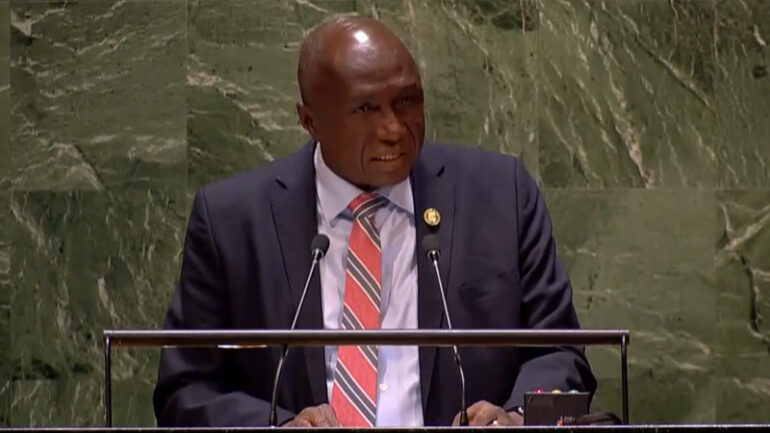United Nations General Assembly High-Level Meeting on Disaster Risk Reduction

- Posted by admin
- Posted in Statement & Remarks
Hon. Ambrose Dery
Ghana’s Minister for Interior
New York, New York
May 18, 2023
Mr. President,
Excellencies and Distinguished Delegates,
I align myself with the statements delivered by the distinguished representatives of Cuba and South Africa speaking on behalf of the G-77+China and the African Group respectively. In May, 2015 in the Sendai Prefecture, in Japan, the world endorsed the Sendai Framework for Disaster Risk Reduction. The commitment was high and we could not wait to see the impact of it’s implementation. In furtherance of this commitment, the African Union (AU) came up with a Program of Action (POA) with additional African focused targets. Fortunately, the Sendai Framework was designed to be coterminous with Agenda 2030. It was to enhance the implementation of the Sustainable Development Goals. Needless to say, that Sustainable Development Goals are pursued within the macro environment of Risks/Disasters and the Sendai Framework ensures a risk-informed sustainable development We are witnesses to the increasing losses across the world caused by disasters – earthquakes, floods, mudslides, heat waves and conflicts, among others. The frequency of disasters and the increasing intensity have exacerbated the disaster menace. In addition, the systemic nature of risk and its resultant residuality have changed the risk narrative.
Mr. President, permit me to touch on the COVID-19 pandemic which revealed the hidden vulnerabilities of our countries. Our weaknesses were exposed and the need for the implementation of the Sendai Framework emphasized. The Covid-19 taught bitter lessons in the area of preparedness. So our Government has carried out a number of post COVID initiatives. One such initiative is that we have established a National Vaccine Institute to build local capacity and to develop direction and implementation for vaccine production and manufacturing to meet future epidemics. The residual socio-economic effects of the pandemic are affecting all of us tremendously. Financing Disaster Risk Reduction continues to be a challenge.
Permit me to mention that investment in resilient infrastructure, early warning systems, and disaster risk insurance schemes, cannot be overemphasized. We welcome partnership from the Private Sector and Innovative Financing Mechanisms such as disaster risk insurance, to finance disaster risk reduction measures. These nonetheless, would require prioritization of needs and making maximum use of resources, as well as recognizing the need for weak economies to attain economic resilience.
Mr. President, I appeal to relevant stakeholders to make good their obligation pursuant to a ground-breaking agreement at the COP 27 to provide loss and damage assistance for vulnerable nations severely affected by floods, droughts and other climate related disasters. Funding is key.
Mr. President, Ghana has taken steps to implement the Sendai Framework over the years. We have revised our national building code to take into consderation the current hazard profile. Ghana is faced with earthquake threat with the country experiencing frequent tremors. To solve this problem holistically the country has developed a comprehensive plan to redirect our focus to deal with earthquake preparedness and response. We realize that the local government system would be effective for implementing the Sendai Framework. In Ghana, the local government system, called District Assemblies have their operations decentralized. The Government has a system in place to ensure that Disaster Risk Reduction is mainstreamed in their Medium Term Plans before they are approved for implementation. Since the local government level is the hub of national development, disaster risk reduction at this level has afforded enhanced sustainability for Sendai Framework and ultimately the SDGs. To address the environmental problems, we have embarked on a number of measures/interventions. Greening the environment is owned by the citizenry. Every year the program is rolled out to ensured a reduction
in the greenhouse effect.
Mr. President, the implementation of the Sendai Framework in Ghana is challenged. The illegal surface mining, termed Galamsey, has polluted our water bodies and a threat to the survival of our future generations. The problem is complex – economic, social and cultural dimension, among others. Government is committed to fighting the Galamsey menace in Ghana. Distinguished delegates, the world faces, increasing risks from climate change-related disasters. We call on all stakeholders to come together in building more resilient communities and reduce the impact of disasters. We need to consider ways of addressing the linkages between climate change and disaster risk reduction.
Mr. President, Excellencies, we owe the future generation, the right to life. We must bequeath to future generations an environment buoyant with a balanced ecosystem. We must gird our loins to save our dear planet.
Thank You.
